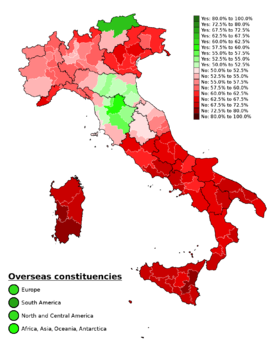Italian constitutional referendum, 2016
| Italian constitutional referendum | ||||||||||||||||||||||
|---|---|---|---|---|---|---|---|---|---|---|---|---|---|---|---|---|---|---|---|---|---|---|
| Do you approve the text of the Constitutional Law concerning 'Provisions for overcoming equal bicameralism, reducing the number of Members of Parliament, limiting the operating costs of the institutions, the suppression of the CNEL and the revision of Title V of Part II of the Constitution' approved by Parliament and published in the Official Gazette no. 88 of 15 April 2016? | ||||||||||||||||||||||
| Date | 4 December 2016 | |||||||||||||||||||||
|
||||||||||||||||||||||
|
||||||||||||||||||||||
| On the map, the darker shades for a colour indicate a larger margin. Votes cast abroad are displayed in the bottom left for the four overseas constituencies of Italian Parliament. | ||||||||||||||||||||||
A constitutional referendum was held in Italy on Sunday 4 December 2016. Voters were asked whether they approve a constitutional law that amends the Italian Constitution to reform the composition and powers of the Parliament of Italy, as well as the division of powers between the State, the regions, and administrative entities.
The bill, put forward by then- Prime Minister of Italy, Matteo Renzi, and his centre-left Democratic Party, was first introduced by the government in the Senate on 8 April 2014. After several amendments were made to the proposed law by both the Senate and the Chamber of Deputies, the bill received its first approval on 13 October 2015 (Senate) and 11 January 2016 (Chamber), and, eventually, its second and final approval on 20 January 2016 (Senate) and 12 April 2016 (Chamber).
In accordance with Article 138 of the Constitution, a referendum was called after the formal request of more than one fifth of the members of both the Senate and the Chamber of Deputies, since the constitutional law had not been approved by a qualified majority of two-thirds in each house of parliament in the second vote. 59.11% of voters voted against the constitutional reform, meaning it did not come into effect. This was the third constitutional referendum in the history of the Italian Republic; the other two were in 2001 (in which the amending law was approved) and in 2006 (in which it was rejected).
Had the voters approved the constitutional law, it would have achieved the most extensive constitutional reform in Italy since the end of the monarchy, not only influencing the organization of the Parliament, but also improving, according to its proponents, on the poor government stability of the country. Opposition parties harshly criticised the bill, claiming that it was poorly written and would have made the government too powerful.
Following the clear victory of the "No" vote, Renzi tendered his resignation as Prime Minister.Paolo Gentiloni was selected as his replacement on December 11.
...
Wikipedia

